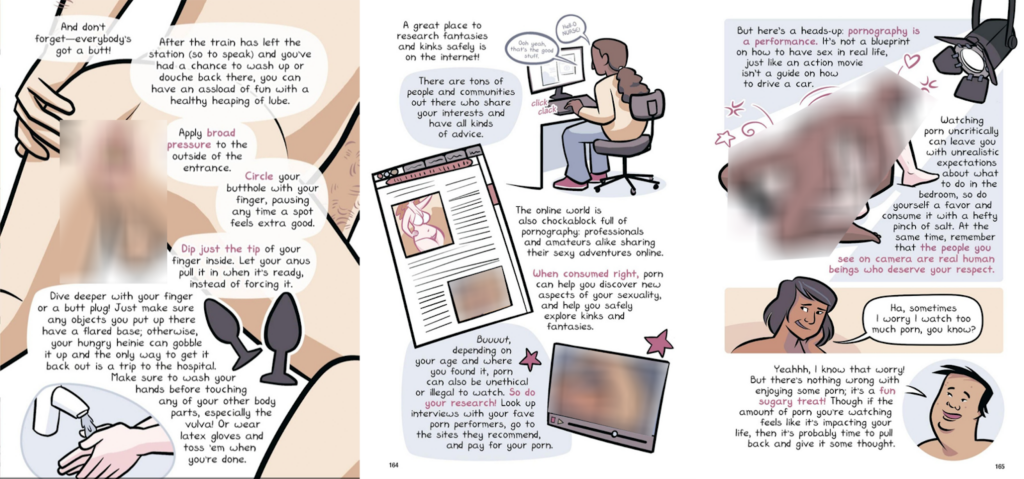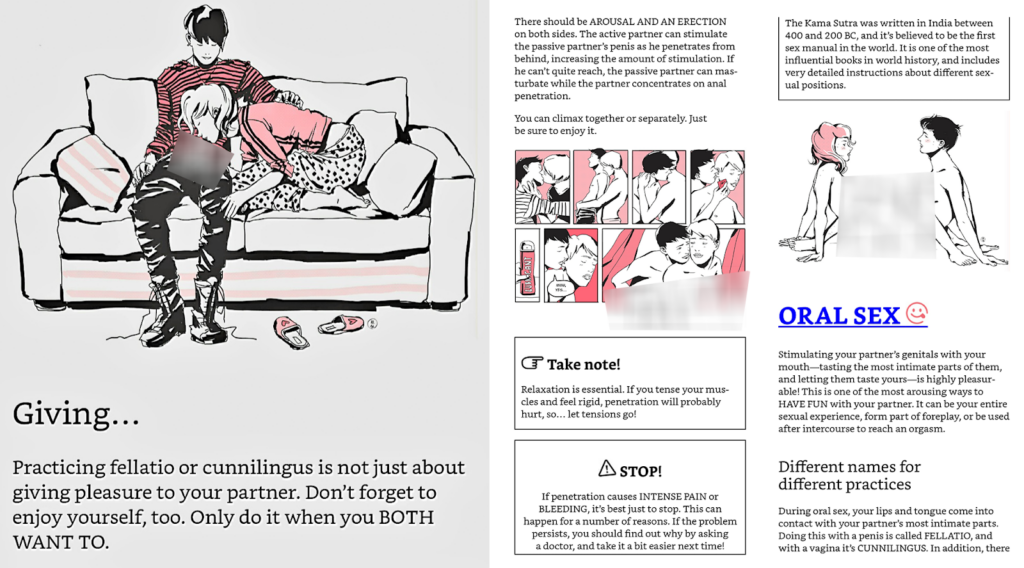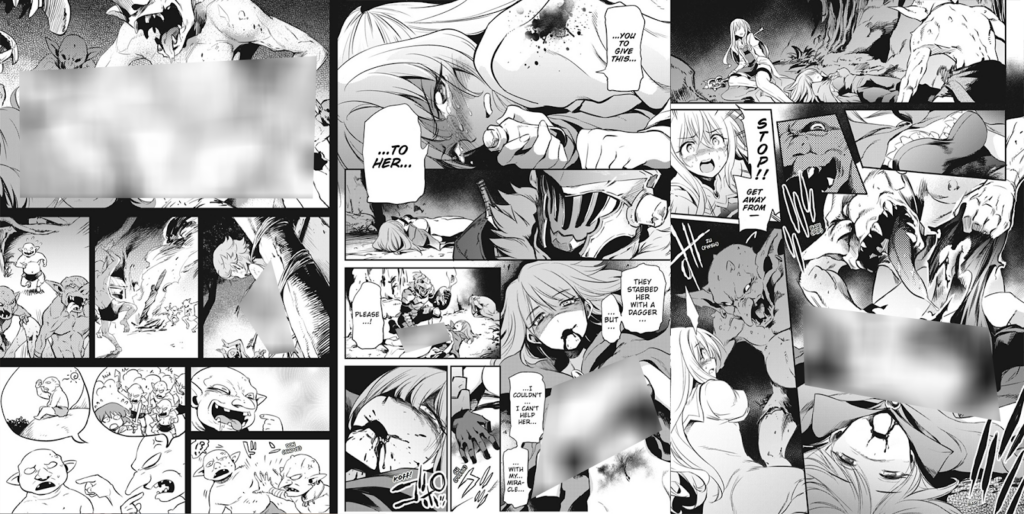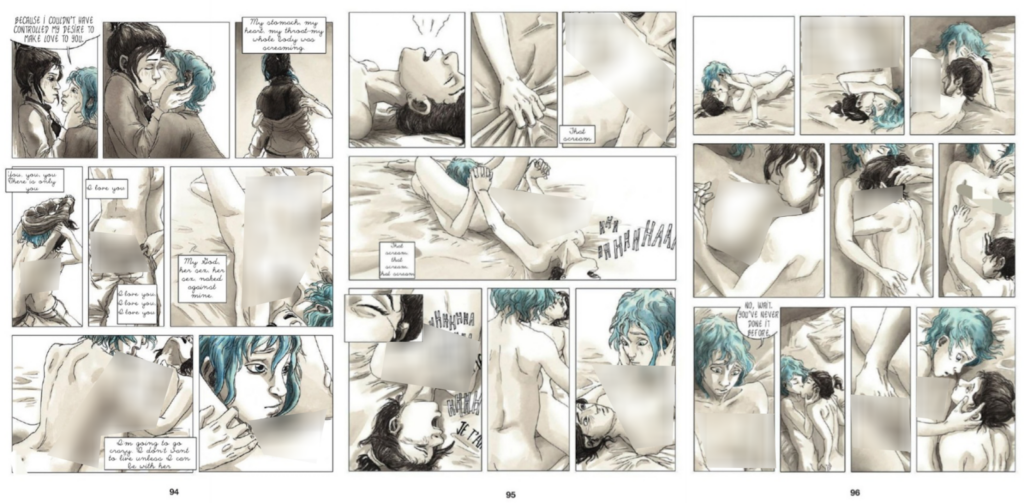Pornographic Books Found in Texas School Libraries Result in Bipartisan Action to Remove Them
Tony Kinnett /
Warning: This report contains sexually graphic images from commonly available books in school libraries, which The Daily Signal has obscured in part.
A bill that has passed the Texas House with bipartisan support could become the model for ensuring public school libraries don’t provide sexual content to children.
HB 900, sponsored by four Republicans and a Democrat, specifies what “sexual content” is and prescribes actions by Texas public schools to ensure children aren’t given access to pornographic, sexually explicit, or other age-inappropriate materials.
The bill passed April 19 by a vote of 95-52, with support from 82 Republicans and 13 Democrats. All of the “no” votes were from Democrats.
The GOP-controlled Texas Senate is expected to pass a companion version of HB 900, and Gov. Greg Abbott, a Republican, is expected to sign the measure into law.
Sexually explicit books and graphic novels (told in a comic-book format) have become a common sight in American schools over the past several years, with graphic novels such as “Let’s Talk About It,” “Ready for It,” “Goblin Slayer,” “Gender Queer,” and dozens of others that concern parents, teachers, and millions of other adults who believe pornographic images and the promotion of sexuality have no place in public schools.
Christin Bentley, chair of a committee on child sexualization prevention for the Texas Republican Party, told The Daily Signal that finding these books in Texas schools drove bipartisan support for HB 900.
Although many LGBTQ+ advocates claim that sexually inappropriate books aren’t found in Texas’ public school libraries, the facts say otherwise:
“Let’s Talk About It,” which has attracted extensive scorn for depicting minors having sex, recommending that teens watch porn, and encouraging minors to practice sexual activities, has been found in Killeen, Arlington, Dallas, Austin, Krum, Rowlett, Spring, College Station, Houston, Tomball, Fort Worth, Burleson, El Paso, Christoval, and Pittsboro independent school districts.
(Reminder: The Daily Signal has obscured sexually explicit images, but some readers still may find them offensive.)

Both the Austin and Dallas independent school districts allowed children to check out “Ready for It,” a guidebook that advises teens how to practice oral sex and gay anal sex, including graphic imagery portraying both actions.

The Dallas, Longview, and Paris independent school districts have included “Goblin Slayer” in their libraries, although the book contains pornographic sequences in which goblins molest or rape female characters.

“Blue Is the Warmest Color” is another graphic novel with sexually explicit scenes, pictured below, and it is found in the school libraries of the Dallas, Frisco, and Tyler independent school districts.

LGBTQ+ advocates claim that these books are harmless, and that books containing pornography are essential for sexual development. These activists often have claimed that Republicans are “just seeking to ban books” without using any specific standard.
But Jonathan Butcher, an education expert at The Heritage Foundation, underlines the appropriate roles of parents and educators in addressing certain subjects. (The Daily Signal is Heritage’s multimedia news organization.)
Butcher, testifying in support of the Texas bill, noted that “effective teaching” counts on parents and educators being responsible “for determining the times, places, and topics for these discussions.”
State Reps. Jared Patterson, Brad Buckley, Dustin Burrows, and Matthew Shaheen, all Republicans, and Oscar Longoria, a Democrat, co-sponsored the legislation.
HB 900 defines “sexually explicit materials” as any communication, language, or material, including a written description, photographic or video image, or audio file, excluding library material directly related to required curriculum, as referenced in the state’s existing education and penal codes.
In short, HB 900 says that school libraries may not provide students with any materials displaying or encouraging sexual conduct already defined by the Texas Penal Code.
HB 900 would restrict schools from purchasing, housing, and providing these and other sexually explicit books and graphic novels to students. But unlike other bills around the country that have attempted to set standards for school libraries on sexual content, this Texas bill provides a unique method of enforcement.
Vendors that attempt to sell these sexually explicit materials will be required to label their material before sale, and schools caught purchasing sexually explicit material would be banned indefinitely from purchasing any book or material from the selling vendor.
This means that any vendor caught selling sexually explicit content to a Texas public school district would be banned from selling anything to that Texas public school district in the future.
The largest criticism of prohibiting sexually explicit content in school libraries is the fear, driven by LGBTQ+ activists, that these bills target LGBTQ+ individuals in a “thinly veiled” homophobic attack.
Bentley, chair of Texas Republicans’ committee on preventing sexualization of children, told The Daily Signal otherwise, however.
“The bill is carefully worded to ensure that inappropriate content, not ideologies or lifestyles, are restricted in the classroom,” she said. “The bill doesn’t ban anyone or forbid libraries from including books about gay people—that’s a blatant lie.”
In his testimony supporting HB 900, Butcher, a senior research fellow in education at Heritage, pointed out the importance of protecting children from sexually explicit material:
Lawmakers must consider proposals that make parents and educators partners in determining what instructional content is age-appropriate for students. Lawmakers should not protect students from material with which he or she disagrees, nor should policymakers attempt to censor classroom discussions on age-appropriate information.
The pursuit of truth requires that educators challenge students, at appropriate ages, with ideas that test common assumptions and prejudices.
However, embedded in the process of effective teaching are parents’ and educators’ responsibilities for determining the times, places, and topics for these discussions. This is especially important for lessons and conversations about biological sex and sex acts included in “‘sexually explicit material,’” defined in the proposal as “any communication, language, or material … that describes or portrays sexual conduct … in a patently offensive way.”
These are deeply personal topics that involve individual beliefs about personal behavior, habitus religion, and health. Material covering sex transforms from instructional to pornographic in nature when it does not describe a physical act for the purpose of academic instruction but is designed to create sexual arousal in those consuming the material.
The current proposal appropriately sets procedures and guidelines for educators to follow regarding this content.
Have an opinion about this article? To sound off, please email [email protected], and we’ll consider publishing your edited remarks in our regular “We Hear You” feature. Remember to include the URL or headline of the article plus your name and town and/or state.
